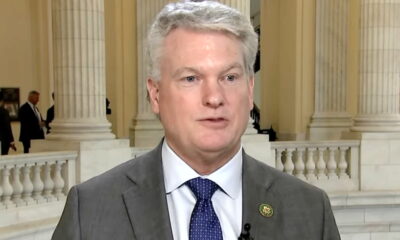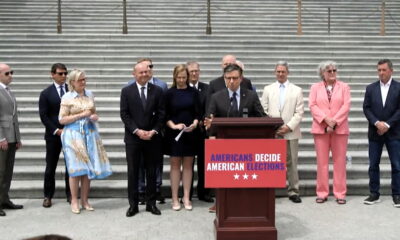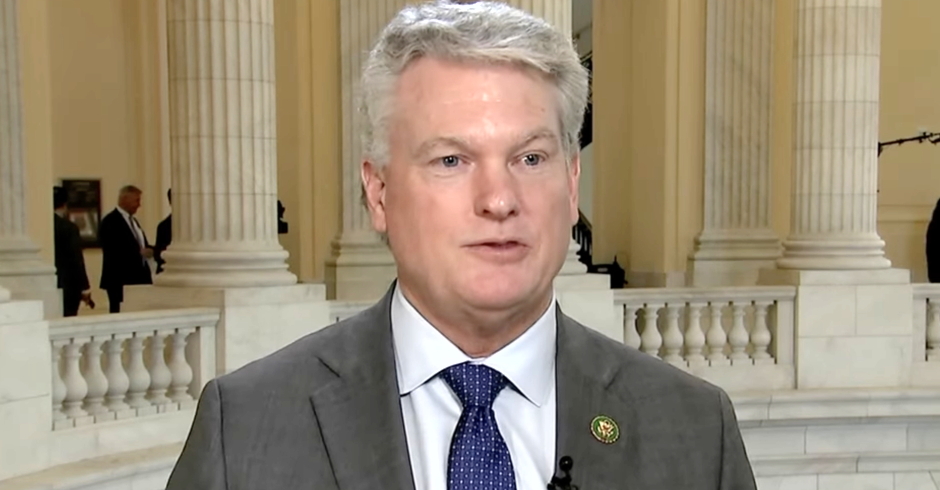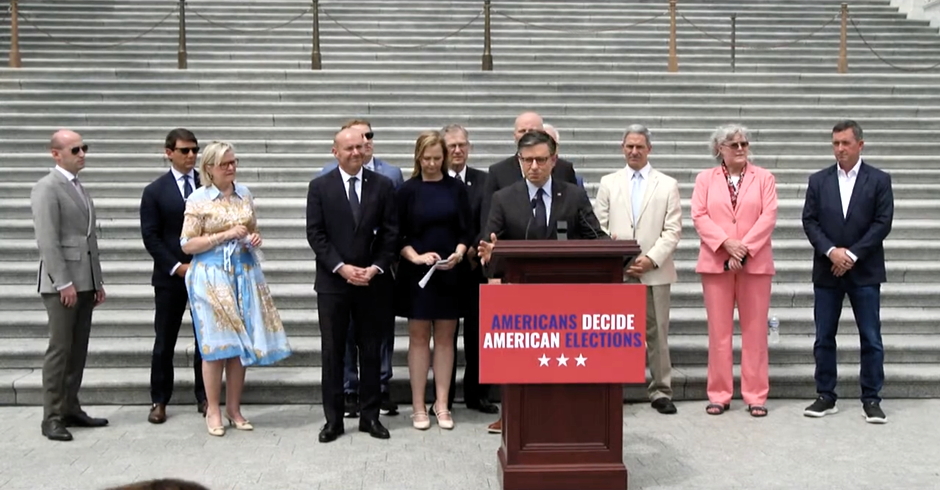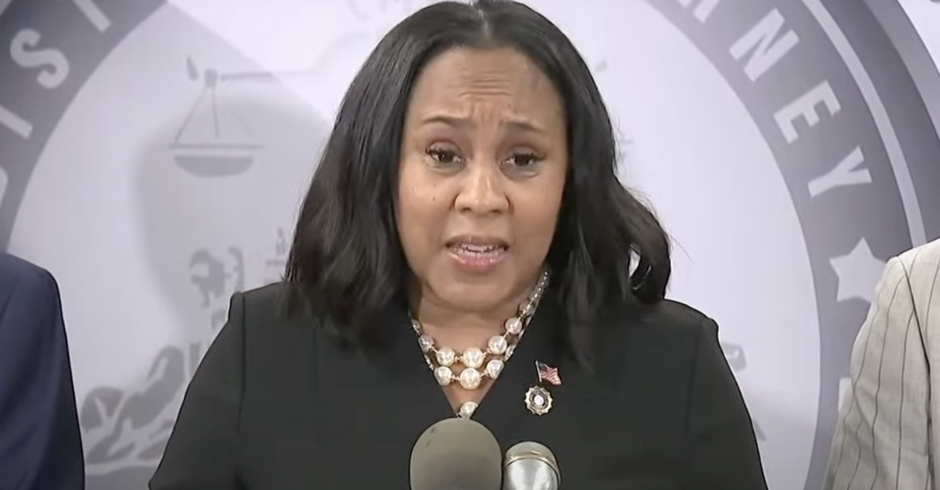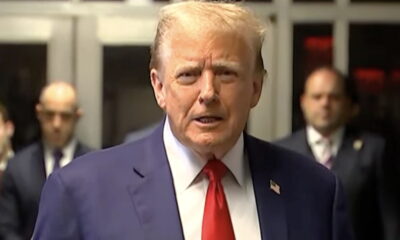News
Texas Conservatives Test How Far They Can Extend Abortion and Gender-Transition Restrictions Beyond State Lines
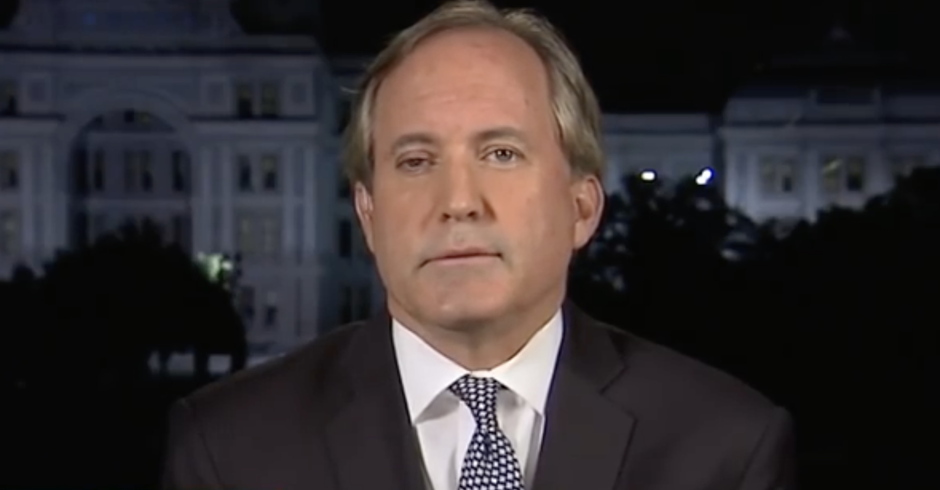
“Texas conservatives test how far they can extend abortion and gender-transition restrictions beyond state lines” was first published by The Texas Tribune, a nonprofit, nonpartisan media organization that informs Texans — and engages with them — about public policy, politics, government and statewide issues.
Sign up for The Brief, The Texas Tribune’s daily newsletter that keeps readers up to speed on the most essential Texas news.
In the months since Texas outlawed abortion and prohibited adolescents from receiving gender-transition care, women have flooded abortion clinics in nearby states and parents with transgender children have moved to places where puberty blockers and hormone therapy remain legal.
So now, Texas conservatives are testing the limits of their power beyond state lines.
Some cities and counties have passed so-called travel bans aimed at stopping Texans from driving to abortion appointments in other states. Meanwhile, Attorney General Ken Paxton has demanded medical records from at least two out-of-state clinics that provide gender-affirming care to minors.
“This request from the Texas Attorney General is a clear attempt to intimidate providers of gender-affirming care and parents and families seeking that care outside of Texas and other states with bans,” Dr. Izzy Lowell, a Georgia physician who received one such demand letter, said in a statement.
These recent efforts to restrict or scrutinize what Texans do out-of-state raise an important question: Just how far does Texas’ authority over its residents extend?
The question of extraterritoriality — when and whether a state can impose its laws beyond its borders — is largely unresolved, legal experts say. It just hasn’t come before the courts that often. And while the right to travel is well-established in the U.S. Constitution, the local travel bans are enforced through private lawsuits, a legal loophole the U.S. Supreme Court has so far allowed to stand.
When the U.S. Supreme Court allowed states to set their own laws on abortion, it put them on a political crash course with each other. These recent legal maneuvers from conservatives in Texas indicate a willingness to wade into a Constitutional morass the country hasn’t dealt with since the lead-up to the Civil War.
“Slavery is probably the best historical parallel to what we’re seeing now,” said Kermit Roosevelt, a law professor at Penn Carey Law at the University of Pennsylvania. “Obviously, that didn’t end well. Well, it did, because we abolished slavery federally, but it was a tough road.”
Extraterritoriality, Texas-style
In most cases, state laws align pretty well with each other. All states prohibit murder and they all criminalize child abuse. When there’s conflict, it’s usually over wonky things like environmental regulations and what food additives can be used to make candy, and everyone works together to find a common-sense solution.
Even on more controversial issues, like gambling and marijuana laws, states with stricter rules usually just turn a blind eye as their residents flood casinos and dispensaries just over state lines.
“Maybe a state like Wyoming prosecutes someone who bought marijuana in Colorado and came back to Wyoming, but it doesn’t set off a battle where Wyoming is trying to get someone back from Colorado or get evidence from Colorado,” said Darryl Brown, a law professor at the University of Virginia School of Law. “States just haven’t disagreed with each other so sharply that they have come to loggerheads about this.”
Until recently.
When the Supreme Court overturned Roe v. Wade, allowing states to set and enforce their own laws about abortion, it put red and blue states at odds with each other on an extremely hot-button political issue. All states still agree murder is bad. They just don’t all agree on whether abortion is considered murder.
In 1974, just after Roe was decided, the high court ruled in Bigelow v. Virginia that a “state does not acquire power or supervision over the internal affairs of another State merely because the welfare and health of its own citizens may be affected when they travel to that State.”
But in a Columbia Law Review article, legal scholars David Cohen, Greer Donley and Rachel Rebouché note that, in addition to being an old ruling that focused on First Amendment arguments, Biglow relied in part on Roe v. Wade.
“The current U.S. Supreme Court, now that it has eviscerated Roe, could revisit Bigelow’s anti-extraterritoriality principle,” they wrote.
Roosevelt, the Pennsylvania law professor, said if you remove politically heated issues like abortion or gender-affirming care from the equation, it can make sense to let states punish bad actors and protect vulnerable residents anywhere in the country.
“Imagine states have different laws about the degree of violence that parents can inflict on children in order to chastise them,” Roosevelt said. “Is it really OK if a Texas parent takes their child to the state that allows whipping just in order to whip them? I think we’d all agree, probably not.”
But much like disagreements over whether abortion is murder, states now sharply disagree on whether providing a trans child access to puberty blockers and hormone therapy constitutes child abuse. Major medical groups, trans people and LGBTQ+ advocates say such care is lifesaving for kids who face higher rates of suicide attempts and mental health problems than their cisgender peers. But Republicans and others who oppose letting kids access gender-affirming care say medical providers have latched on to a “social contagion” to misguide parents and push life-altering treatments on kids.
In Texas, Gov. Greg Abbott previously ordered the state’s child welfare agency to investigate parents who provide their trans children with gender-affirming care even after lawmakers failed to explicitly add such treatments to the state’s definition of child abuse.
But as Paxton will likely learn with these recent administrative subpoenas to medical providers in Washington and Georgia, nothing requires states to help each other with cross-border investigations. And, in some cases, it’s even prohibited.
Washington is one of 22 states that have passed or enacted “shield laws,” that protect health care workers from extraterritorial investigations. While these laws tend to focus on abortion providers, nine states, including Washington, specifically include protections for gender-affirming care.
“If Texas wants to arrest someone who’s in Washington State, one of their residents, Washington doesn’t have to arrest that person and extradite them back to Texas,” Brown said.
Most notably, many of these shield laws, including the one in Washington, prohibit sharing patients’ confidential information, even if they’re issued a subpoena to do so. Seattle Children’s Hospital, which received one of Paxton’s administrative subpoenas, has sued Texas to protect records of transgender patients.
Karen Loewy, senior counsel and director of constitutional law practice at Lambda Legal, said there is nothing in the law lawmakers passed last session to ban gender-affirming care for minors that regulates what happens outside the state. The letters Paxton sent don’t mention the gender-affirming care ban, but instead came on behalf of a consumer protection investigation, which doesn’t give Paxton jurisdiction to subpoena information from non-Texas entities, Loewy said.
“More than anything it’s designed to scare Texas families,” Loewy said. “This more smacks of efforts to just send a loud and clear message that the Attorney General’s Office is going to do everything — whether in its power or not — to cut off access to care that trans kids in Texas really need.”
Paxton’s office has been silent as to the intent of the letters since they became public in December.
A warning sign
In Georgia, Lowell received Paxtons demand for her patient’s medical information the day it was due. The physician’s mail had been stopped for weeks after an arsonist set fire to QueerMed, her gender-affirming care clinic.
Her lawyers had to negotiate with Paxton’s office to get a one-week extension to review the letter. Lowell ultimately declined to turn over patient information.
Jeff Graham, executive director of the LGBTQ+ advocacy group Georgia Equality, said political rhetoric and misinformation can exacerbate the threats LGBTQ+ people and their medical providers face. Paxton’s demands are a warning sign, even if the attorney general knows they might fail, he said.
“People around the country really should be paying attention to [what happened at QueerMed] because it’s showing the lengths that these politicians are going to strip people from their ability to make medical decisions for themselves and their families,” Graham told The Texas Tribune.
The attorney general’s office has not sought records from any out-of-state abortion clinics, according to a review of its civil investigative demand letters. But conservative legal activist and former Texas Solicitor General Jonathan Mitchell has tried to get abortion funds to hand over records of clients they have helped obtain abortions out-of-state. A federal judge in Austin, in addition to rejecting Mitchell’s request for the records, has ruled that abortion funds are likely safe from prosecution if they help Texans pay for abortions elsewhere.
But this is unlikely to stop conservative efforts to block people from accessing certain health care outside Texas.
“There’s a lot of states with laws that seem to permit them to go after out-of-state conduct, and a lot of political activists or politicians saying that we really need to do this,” said Roosevelt. “But I’m not aware of states actually doing the most aggressive thing, which is trying to prosecute an abortion provider or health care provider in another state.”
Local travel bans
Four counties and a handful of cities in Texas have passed local ordinances that prohibit using county roads to transport someone out of state to get an abortion.
These ordinances are enforced through private lawsuits instead of by government entities, the same novel legal mechanism that Texas used to ban abortions after about six weeks of pregnancy in 2021. The Supreme Court, while expressing frustration with the constitutional workaround, allowed the six-week abortion ban to stand, saying the private enforcement mechanism didn’t allow for pre-enforcement review.
In general, it’s much easier for a state or local government to regulate what happens within its borders than to try to enforce their laws in other places. But efforts to restrict travel, even within a state or county, likely will run afoul of the constitutional right to travel, which Noah Smith-Drelich, a law professor at the Chicago-Kent College of Law, said is better thought of as several intersecting rights.
“The constitutional provisions that protect your right to travel from, for example, Texas to Washington, include some provisions that may not protect your right to travel within the state of Texas,” Smith-Drelich said. “I think it’s a reflection of just how important, how fundamental travel is, that there are multiple different constitutional protections that say you can’t limit travel without a really good reason.”
The Supreme Court has not often been called to litigate the right to travel, Smith-Drelich said, but it’s an example judges often point to in other decisions as a fundamental right that’s not up for debate. It’s also historically been an ideologically neutral legal question.
“I don’t know that it’d be optimistic about challenging Texas’ restrictions on travel, in service of preventing abortion outside of Texas, in front of the 5th Circuit,” Smith-Drelich said, referring to the conservative court that hears federal appeals originating in Texas. “But I wouldn’t be as pessimistic about that as I would probably most efforts to limit Texas’s anti-abortion efforts.”
And, much like Paxton’s letters seeking out-of-state medical records, these bans don’t have to be enforced to incite fear among health care providers or abortion seekers and those helping them cross state lines.
History lessons
For legal scholars and historians, these efforts are a little too reminiscent of another period in U.S. history, when individual states’ laws began to sharply diverge over a highly contentious issue.
“States have very different policies on lots of different stuff, but they tend to just keep those policies within their own borders,” Brown said. “What’s unusual here and what was unusual about slavery is that states were extending their own policy or enforcing their own policy in states that didn’t agree with them.”
In the 1800s, as some states abolished slavery and others clung to it more tightly, free states began passing personal liberty laws saying they would not cooperate with efforts to return escaped enslaved people to their enslavers.
Slave states, especially border states, pushed for and won the federal Fugitive Slave Act of 1850, which required free states to work with the federal government to return enslaved people to their enslavers in the South. This helped tip the nation into the Civil War.
Reconstruction, the period of putting the nation back together after the Civil War, marked a shift in the balance of power between states and the federal government.
“States lost some of what you might have described as their sovereignty or independence through that,” said Smith-Drelich. “Part of what we’ve seen through U.S. history is this move to becoming more of a country and less of a confederacy of states, and Reconstruction was a big part of that.”
The 2022 Dobbs decision, allowing states to set their own laws around abortion, in many ways represents a significant reversal of that trend. While both major political parties are angling to pass a federal law that would either prevent or preserve abortion access, the current status quo all but guarantees increased state-on-state litigation to undermine and frustrate each other’s goals.
As the Civil War demonstrated, these state-level feuds can have ripple effects far beyond the contentious political issue of the day. The American experiment requires states to work together relatively amicably under the auspices of one, overarching federal government. It’s one of the things that makes the United States different from the European Union.
“In order for us to work as a united country, states have to be able to make laws that apply in their own states,” Smith-Drelich said. “And part of that means that they can’t really be making laws apply outside of their own state.”
But it remains to be seen whether the courts will see their way to maintaining that balance of power, especially without much precedent to guide them. And after a decades-long push to reshape the federal court system in the conservative image, especially in Texas, these precedent-setting cases have the potential to radically change certain accepted — but not often litigated — rights.
“Sometimes, I feel like the law is clear enough that the Supreme Court is going to follow it,” Roosevelt said. “But I don’t think the law is very clear here. And abortion is definitely an issue where the justices care intensely. So I think if you want to predict what’s going to happen, you basically have to just look at who’s on court.”
We can’t wait to welcome you to downtown Austin Sept. 5-7 for the 2024 Texas Tribune Festival! Join us at Texas’ breakout politics and policy event as we dig into the 2024 elections, state and national politics, the state of democracy, and so much more. When tickets go on sale this spring, Tribune members will save big. Donate to join or renew today.
This article originally appeared in The Texas Tribune at https://www.texastribune.org/2024/02/09/texas-abortion-transgender-care-outside-state-borders/.
The Texas Tribune is a member-supported, nonpartisan newsroom informing and engaging Texans on state politics and policy. Learn more at texastribune.org.
Enjoy this piece?
… then let us make a small request. The New Civil Rights Movement depends on readers like you to meet our ongoing expenses and continue producing quality progressive journalism. Three Silicon Valley giants consume 70 percent of all online advertising dollars, so we need your help to continue doing what we do.
NCRM is independent. You won’t find mainstream media bias here. From unflinching coverage of religious extremism, to spotlighting efforts to roll back our rights, NCRM continues to speak truth to power. America needs independent voices like NCRM to be sure no one is forgotten.
Every reader contribution, whatever the amount, makes a tremendous difference. Help ensure NCRM remains independent long into the future. Support progressive journalism with a one-time contribution to NCRM, or click here to become a subscriber. Thank you. Click here to donate by check.
 |

